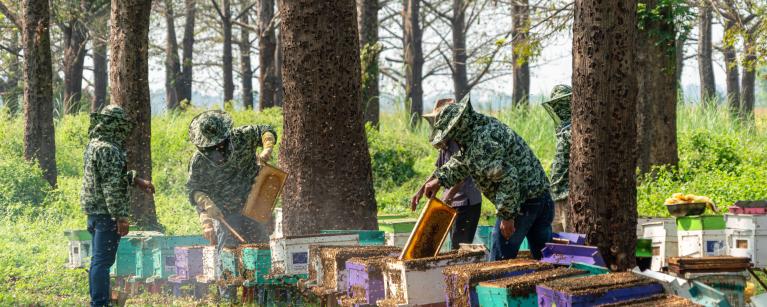A beekeeping group in Battambang province is buzzing with success! Formed in 2022 under the Community Green Business Hub (CGBH) initiative, supported by the EU-CAPFISH/FOSTER project, this group of five members, including one woman, has transformed beekeeping into a thriving business.
The initiative, which runs from March 2021 to June 2025, aims to enhance community fisheries and promote sustainable livelihoods. It has empowered local farmers to adopt beekeeping as a viable source of income, integrating it into environmental conservation and community development efforts.
Samnang Nov, a 34-year-old member of the Sdey Kraom Rohal Soung community fishery, manages the beekeeping operations. Under his guidance, the group has achieved remarkable success, harvesting 750 liters of honey from 2022 to September 2024.
Of the 750 liters harvested, 315 liters were sold, generating an impressive income of 10,080,000 riels (2,520$). The revenue has been reinvested into the business, allowing for the purchase of essential equipment, expansion of operations, and improvement of honey processing techniques.
“Previously, the community could collect only a few liters of honey for household consumption—around 5 to 10 liters per year. However, after the project’s intervention, our community has increased production to between 500 and 1,000 liters per month, although we still face challenges in accessing markets,” said Samnang.
The beekeeping initiative exemplifies a successful model for sustainable development in Cambodia. By combining economic opportunity with environmental responsibility and community engagement, the project not only enhances livelihoods but also contributes to a resilient and sustainable future.
Bee raising is just one of the activities under the Green Business Hub initiative. Across 10 communes in 3 provinces, 29 groups operate 11 types of businesses, involving 1,942 members, including 1,365 women. These activities are implemented by four project partners including Fisheries Action Coalition Team, Culture and Environment Preservation Association, Sansom Mlup Prey, and Okra Solar.
This beekeeping business model serves as an inspiring example for similar initiatives across the country, demonstrating the impact of targeted support and community-driven efforts in fostering sustainable practices.
Text by: Phalluy Vy/CEPA & Chong Ear
